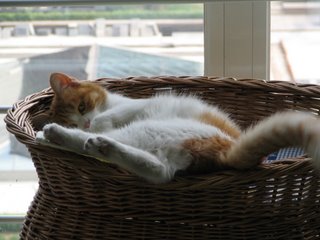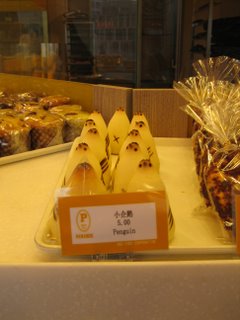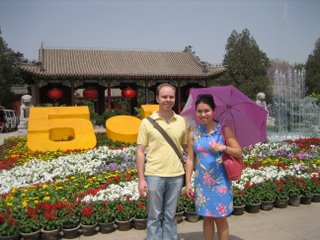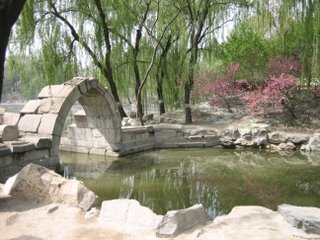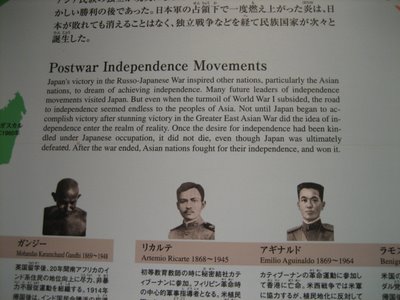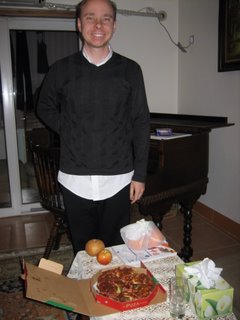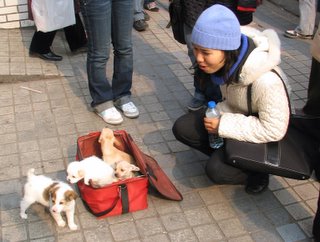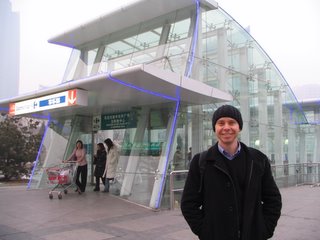Crowding People’s Market for Cabbage: The Price Is Right
By JIM YARDLEY BEIJING, Dec. 18 — At 5:45 in the morning the cabbage line outside the Old Drum Tower Outer Street New People’s Produce Market is nearly two hours old. First in line is a 72-year-old woman named Mrs. Wang, who awoke at 3, arrived at 4 and would wait until 8:30 for a single head of winter cabbage. Free.
Cabbage, or bai cai, costs about 4 cents a head, so Mrs. Wang’s prize was not quite a free refrigerator. She did not mind. Nor did another retired matron who passed the time singing patriotic tunes and a shaky but enthusiastic English rendition of “Baa Baa Black Sheep.” And neither did two elderly combatants who shouted at each another in unprintable Chinese for inexplicable reasons.
“They are just fighting because they have nothing better to do,” explained Mrs. Wang, who declined to provide her first name. “We all know each other. We’re all old neighbors.”
Cabbage and old people are civic institutions in Beijing. Winter brings them together. For generations cabbage has arrived in markets by November, and Beijingers have hoarded it as an insurance policy to last them until spring, depending on the outdoor refrigeration of rooftops or windowsills. Cabbage and turnips were the staples that saw people through the uncertain harvests and aching poverty of the Mao era.
But Beijing’s winter markets are now overrun with enough fruits, vegetables and meats that cabbage, if still widely used, has become as unglamorous as old people — except to old people.
The predawn line outside the Old Drum Tower market represents a marriage of convenience: market managers give away cabbage to attract hordes of fixed-income old people in hopes that the spectacle will attract the curiosity of younger, more affluent morning commuters.
“It’s a win-win situation,” said Zhang Pinsheng, 68, a retired teacher. “The market doesn’t have to spend money on advertising, and we don’t have to spend money on cabbage.”
They do have to wait in freezing predawn temperatures to collect a chunk of greenery of almost no value — or, for that matter, of almost no taste without sauce.
This year farmers grew so much cabbage that prices dipped to record lows in November, with markets charging only a few pennies a head. Even so, when the Old Drum Tower market introduced its cabbage promotion in late November, the daily line soon stretched under two overpasses and past a new luxury hotel.
“If they were going to give away fish or eggs, the line would stretch all the way to Qianmen,” a neighborhood several miles away, said Li Bao, a vendor at the market. “People would start lining up at midnight.”
The incentive for the hundreds of people who come each day is a blend of need, habit, boredom and a desire for companionship. Several people described lives on the margins. Some were retired; others lost their jobs in the changing economy; others depended on minuscule urban pensions. Mrs. Wang said she did not watch television in her apartment, because “the TV uses electricity.”
Mr. Zhang, the retired teacher, said the free cabbage “doesn’t really solve the basic problems you have, but it can help a little.”
“You aren’t going to get rich collecting free cabbage,” he said. “My life is pretty average. We don’t worry about food or clothes. You’re never really full, but you are never going to go hungry.”
Inflation has ticked upward in recent months, and the rising cost of some foods, as well as cooking oil, has brought some anxiety. Recently, Prime Minister Wen Jiabao visited an elderly Beijing woman to offer a public reassurance that the government would fight rising prices.
Cabbage, often used as filling for the steamed dumpling so popular in Beijing, seems mostly immune to inflation, though, and some people admitted that the line here was as much a social event as an economic necessity.
Many retirees in Beijing have limited resources and unlimited time to fill, so they congregate in city parks to practice tai chi or ballroom dancing, or just to talk. Another popular pastime is admonishing parents, including strangers, whose children are deemed to be insufficiently clothed — say, less than five layers — in wintertime.
But a few hours in line can also provide entertainment for people inured to hardship and tedium by a few decades of Communism. “It doesn’t matter if I get a cabbage,” said one man, who like several people declined to give his name. “It’s a nice day and I’ve got nothing to do.”
Another woman with a toothy smile and a pink coat agreed. “We have nothing better to do,” she said. “We go for a walk in the morning. We get in line, and we pick up some cabbage.”
Zhang Hongwei, 27, one of the managers at the market, said the cabbage promotion would last two months. He said that most people in line were not buying other vegetables but that their presence “is good advertising and attracting others.”
“If they weren’t here they would just be walking around in parks,” he said. “And it is a tradition in Beijing to store cabbage in the winter. They need to get their cabbage.”
A certain regimen oversees the process. Regulars arrive early, occasionally shoo newcomers into a single-file line and snatch up the laminated tickets handed out by the market to ensure order. Many people bring cushions for comfortable sitting. Line breakers are barked down.
The magic moment comes promptly at 8:30. On this recent day, a manager began collecting the tickets. Another clerk popped open the rear hood of a white van to reveal green stacks of cabbage. Distribution was methodical — perhaps to drag out the advertising as commuters rushed into a nearby subway stop.
Mrs. Wang collected her cabbage with a satisfied smile. She stuffed it into a plastic bag and walked quickly down the sidewalk, oblivious to the cold.
“To be a little cold for a cabbage is not a big deal,” she said. “Cabbage is delicious.”









